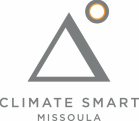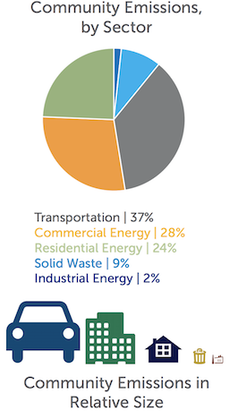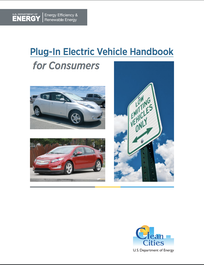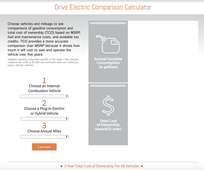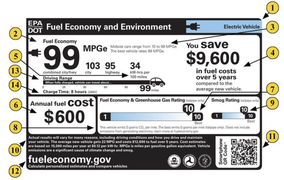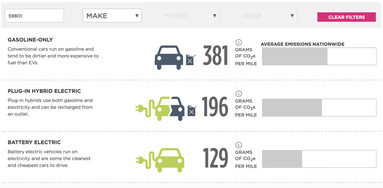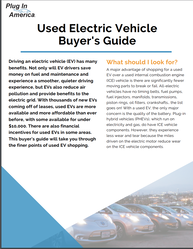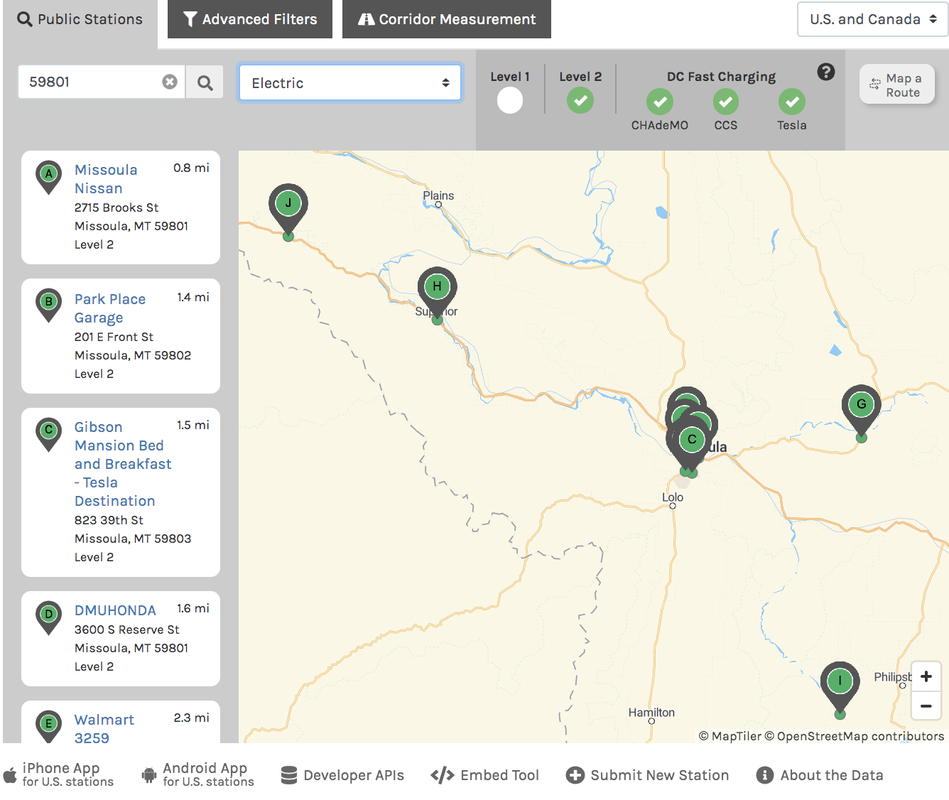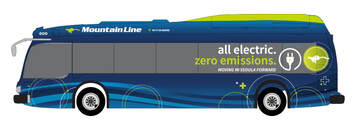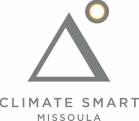|
Low-Carbon Transportation in Missoula
We’re proud to rely on Missoulians to be a part of making our community climate smart. Did you know that transportation accounts for the largest portion of Missoula’s greenhouse gas emissions, representing 37% of our overall carbon footprint? On Road Gasoline makes up a majority (72%) of our total transportation emissions and is therefore a top priority for us to tackle. While we know that having a range of active transportation options is great, we also understand that often people need to drive. With that in mind, a primary way to reduce emissions is go electric: Buses and bikes and cars. More coming soon re buses and bikes. We've been inspired to learn more about EVs from our friends at Flanagan Motors, currently selling pre-owned EVs and has info to offer and cars on their lot! This page is your resource for information on electric vehicles. Here you can learn about the importance of EVs, the different types available, how they work, what to look for when buying, and where to charge them.
|
|
Climate & Environment
Once Missoula achieves 100% Clean Electricity, "filling up" at home or in town will be (almost) guilt free! |
|
Health
|
|
Affordability
|
|
Performance
|
|
Energy Security
|
|
An electric vehicle (EV) is any vehicle that is powered by electricity derived from a power plug. A battery electric vehicle (BEV) or all electric vehicle (AEV) is an electric vehicle that drives solely on power from a plug. A plug-in electric hybrid (PHEV) is a vehicle that can run on both electricity and gasoline. They typically run first on electricity and then draw on gasoline to supplement the ride when the electric power runs out. |
Engine
Instead of an internal combustion engine (ICE), an EV relies on an electric motor combined with a large battery pack. The batteries are charged by plugging the vehicle into an outlet or charging station.
Fuel Economy
Just as miles per gallon (mpg) tells you how many miles your vehicle can travel on one gallon of gas, MPGe tells you how many miles per gallon your electric vehicle would get if it were fueled with gasoline. This equivalent is often seen on electric vehicle labels and is typically around 100MPGe.
An egallon is another way to compare fueling costs that is expressed as the cost of fueling a vehicle with electricity compared to a similar vehicle that is fueled with gasoline.
kWh/100 miles is a standard measure of your fuel consumption rate. It tells you how many much energy your vehicle uses to travel 100 miles. This figure relates directly to the amount of electricity used to power your vehicle and is therefore indicative of efficiency and fueling cost.
Charging
Level 1 Charger: your EV will come with a plug that is compatible with a standard 120V household wall outlet. This is a great option for overnight charging. Your EV will gain 3-5 miles of driving range for every hour it is plugged in.
Level 2 Charger: These are typically installed in public charging stations or private office buildings. Using a 240 volt circuit, every hour your EV is charging will add 10-25 miles of driving range. Your vehicle will be fully charged overnight.
DC Quick-Charge: This is the fastest charging circuit and is only available at commercial locations. Depending on the charger and vehicle combination your EV will gain anywhere from 65-130 miles of driving range in 20-30 minutes.
Driving Range
Driving range varies between models and is dependent on the vehicle's battery quality and efficiency. Most can travel 100 miles on a full charge, with other models travelling up to 300 miles on a single charge.
Instead of an internal combustion engine (ICE), an EV relies on an electric motor combined with a large battery pack. The batteries are charged by plugging the vehicle into an outlet or charging station.
Fuel Economy
Just as miles per gallon (mpg) tells you how many miles your vehicle can travel on one gallon of gas, MPGe tells you how many miles per gallon your electric vehicle would get if it were fueled with gasoline. This equivalent is often seen on electric vehicle labels and is typically around 100MPGe.
An egallon is another way to compare fueling costs that is expressed as the cost of fueling a vehicle with electricity compared to a similar vehicle that is fueled with gasoline.
kWh/100 miles is a standard measure of your fuel consumption rate. It tells you how many much energy your vehicle uses to travel 100 miles. This figure relates directly to the amount of electricity used to power your vehicle and is therefore indicative of efficiency and fueling cost.
Charging
Level 1 Charger: your EV will come with a plug that is compatible with a standard 120V household wall outlet. This is a great option for overnight charging. Your EV will gain 3-5 miles of driving range for every hour it is plugged in.
Level 2 Charger: These are typically installed in public charging stations or private office buildings. Using a 240 volt circuit, every hour your EV is charging will add 10-25 miles of driving range. Your vehicle will be fully charged overnight.
DC Quick-Charge: This is the fastest charging circuit and is only available at commercial locations. Depending on the charger and vehicle combination your EV will gain anywhere from 65-130 miles of driving range in 20-30 minutes.
Driving Range
Driving range varies between models and is dependent on the vehicle's battery quality and efficiency. Most can travel 100 miles on a full charge, with other models travelling up to 300 miles on a single charge.
EVs are a viable option for most lifestyles and budgets. There are more than 50 models commercially available and over 1 million Americans are now driving electric vehicles. If you're used to driving a conventional gasoline powered car then there are a few important factors to consider when shopping for an EV.
We're currently looking into who sells EVs in or around Missoula so stay-tuned. We do know that Flanagan Motors is working to bring as many pre-owned EVs to Missoula as they can and they host lots of great information together with their current fleet HERE.
We're currently looking into who sells EVs in or around Missoula so stay-tuned. We do know that Flanagan Motors is working to bring as many pre-owned EVs to Missoula as they can and they host lots of great information together with their current fleet HERE.
Cost
|
EVs can be more expensive upfront than their ICE counterparts, but when you consider fuel prices, available tax incentives, and your total cost of ownership (TCO), an EV will save you money.
Click here to take a look at the existing federal tax incentives for each EV model |
fuel economy and efficiency
|
It is important to understand the difference between MPGe and kWh/100 miles. kWh/100 miles is representative of your vehicle's efficiency and a lower number of kWh/100 miles means your EV uses less energy to travel 100 miles and is more efficient. This also means it will cost less to fuel your EV.
|
Emissions Potential
Used vs. new
|
This will affect the price of your vehicle as well as your environmental impact. A new EV will have a higher upfront cost and buying used reduces the industry's overall emissions associated with production. Used EVs are an especially great budget and environmentally friendly option.
|
Click on the national fueling station map below to plan a trip or find nearby charging stations by entering different locations and selecting "Electric" as your fuel type.
|
The Missoula Urban Transportation District is working to improve our air quality and reduce our emissions, too. Mountain Line is going electric! They currently have 6 battery electric buses in their fleet to get you from point A to point B with zero emissions.
More on this coming soon! |
|
Websites
|
Articles
|
PDFs
|
